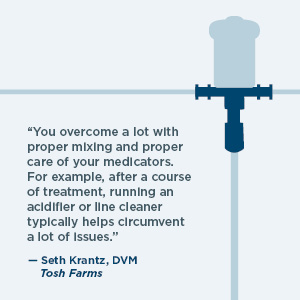
Water-soluble medications have several advantages over other routes of administration when disease spreads through your swine barn. To get the most from your investment, it is important to consider how water quality and mixing protocols can impact water-soluble medication in your swine operation.
Water quality
Pigs experiencing a disease outbreak typically continue to drink water even if an infection diminishes their appetites. Clean, quality water supports increased water intake and helps ensure infected pigs receive the intended dosage when it’s needed most.
Clean water lines improve the efficacy of water-administered medication. Bacteria or other contaminants in water lines could interfere with the antibiotic distribution and the dosage delivered to the pig.
Water system maintenance
Cleaning and maintaining water lines is easier and more cost effective than losing pigs from ineffective medication delivery. It also saves costs associated with repeating treatment in pigs that don’t receive the necessary dosage of medication.
Maintaining a clean water system eliminates potential build-up of bacteria, fungi or minerals and prevents restricted water flow, as well as plugged drinkers or water nipples. Ensure water lines are clean before administering medications, and clean/flush systems after administration to prevent drug residue.
Mixing protocols
Water-soluble medication can be prepared right in your barn for timely administration. Following correct mixing protocols ensures medications are dissolved for accurate dosing. Accurate dosing saves money and is a responsible use of antibiotics because it mitigates excess use of medications.
Proper mixing protocols include using the right amount of water and adequate stirring. Correctly dissolved medications do not plug waterers or nipples. If a medication or other additive is not dissolving in water, an unknown contaminant (other drug residue, bacteria, mineral deposit) is interfering. Review these troubleshooting tips for help addressing the problem.
When water-soluble medication is mixed with clean, quality water, the granules dissolve completely before administration. You know your pigs are receiving the full benefits of antimicrobial treatment as they drink, and you know you are using antibiotics judiciously.
Administering water-soluble medication such as Aivlosin® Water Soluble Granules (62.5% w/w Tylvalosin as Tylvalosin Tartrate) is a fast, flexible way to treat sick pigs when delivered via quality water and using proper mixing protocols.
Important Safety Information: Available under prescription only. AIVLOSIN is indicated for control of porcine proliferative enteropathy (PPE) associated with Lawsonia intracellularis infection in groups of swine intended for slaughter in buildings experiencing an outbreak of PPE. Control of swine respiratory disease (SRD) associated with Bordetella bronchiseptica, Haemophilus parasuis, Pasteurella multocida, Streptococcus suis, and Mycoplasma hyopneumoniae in groups of swine intended for slaughter in buildings experiencing an outbreak of SRD. For use only in drinking water of pigs. Not for use in lactating or pregnant females, or males and females intended for breeding. People with known hypersensitivity to tylvalosin tartrate should avoid contact with this product. When used in accordance with label directions, no withdrawal period is required before slaughter for human consumption.
